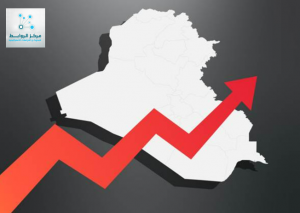By : Shatha Kalel
Inflation, the rate at which the general level of prices for goods and services rises, eroding purchasing power, is a critical economic indicator that reflects the health of an economy. In Iraq, recent data from the Central Bureau of Statistics has highlighted notable trends and regional variations in inflation, providing insight into the underlying causes and broader economic implications.
Recent Inflation Trends in Iraq
In May 2024, the annual inflation rate in Iraq increased by 3.4%. This rise was not uniform across the country, with significant regional disparities:
Kurdistan: 5.34%
Central Governorates: 2.25%
Southern Governorates: 2.6%
These differences highlight the varied economic conditions and pressures in different parts of Iraq.
Key Drivers of Inflation
Several specific categories of goods and services have seen substantial price increases:
Electricity Services: 45.47%
Cigarettes: 23.7%
Fish: 14%
Entertainment Services: 12.9%
Meat: 10.39%
Interestingly, while these goods have seen price hikes, other essential items such as dairy products, oils, fruits, and vegetables have experienced a decline in inflation rates across all governorates.
Inflation Causes
External Factors and Import Dynamics
A peculiar observation is the contrasting inflation trends between goods procured through sanctioned and non-sanctioned banking channels:
Goods with Decreased Prices: Vegetables, fruits, dairy, and oils, which are imported using the parallel market for foreign currency, have seen price declines.
Goods with Increased Prices: Meat, electrical appliances, household appliances, and furniture, which rely on formal banking transactions, have experienced price increases.
This disparity suggests that external factors, such as international trade restrictions and currency availability, significantly influence inflation in Iraq. The reliance on the parallel market for certain imports may create more favorable pricing conditions compared to goods imported through official channels, which are subject to stricter banking regulations and potential sanctions.
Observations on Fuel Prices
Despite a substantial 100% increase in improved fuel prices in May, the overall inflation in fuel prices has not mirrored this rise. This discrepancy indicates potential anomalies in the mechanism for calculating inflation rates, warranting further scrutiny and adjustment by regulatory bodies to ensure accurate reflection of economic realities.
Implications for Policy and Regulation
The inflation index is a vital tool for understanding the impact of various economic activities and requires continuous monitoring and auditing by regulatory authorities. Accurate data collection and analysis are crucial for:
Informed Policy Decisions: Policymakers need reliable data to craft effective economic policies that address inflation and its underlying causes.
Economic Stability: Understanding inflation trends helps in stabilizing the economy and protecting the purchasing power of citizens.
Regulatory Oversight: Ensuring transparency and accuracy in inflation measurement is essential for maintaining public trust and guiding economic interventions.
Conclusion
The recent inflation data in Iraq underscores the complexity of economic dynamics in the country, influenced by both internal and external factors. Regional variations and discrepancies in price trends for different categories of goods highlight the need for nuanced analysis and targeted policy responses. By closely monitoring inflation and its causes, Iraq can better navigate its economic challenges and work towards sustainable growth and stability.
Al Rawabet Center for Research and Strategic Studies

